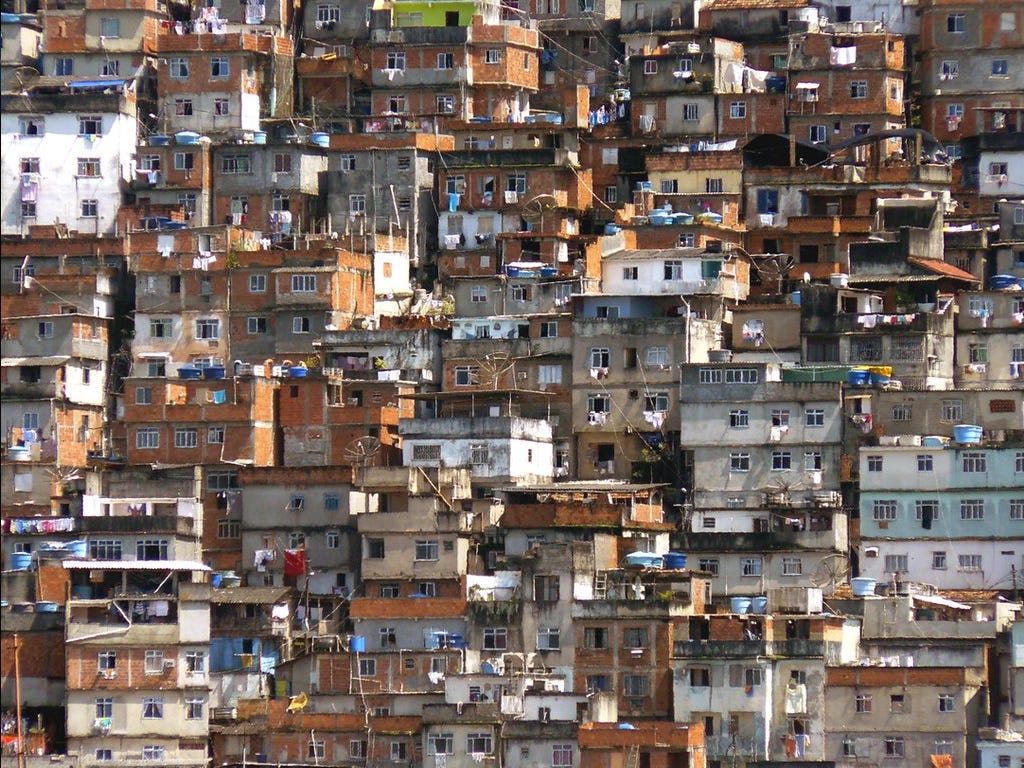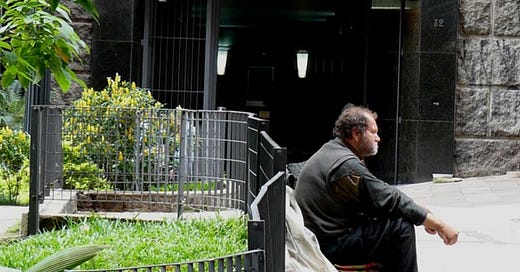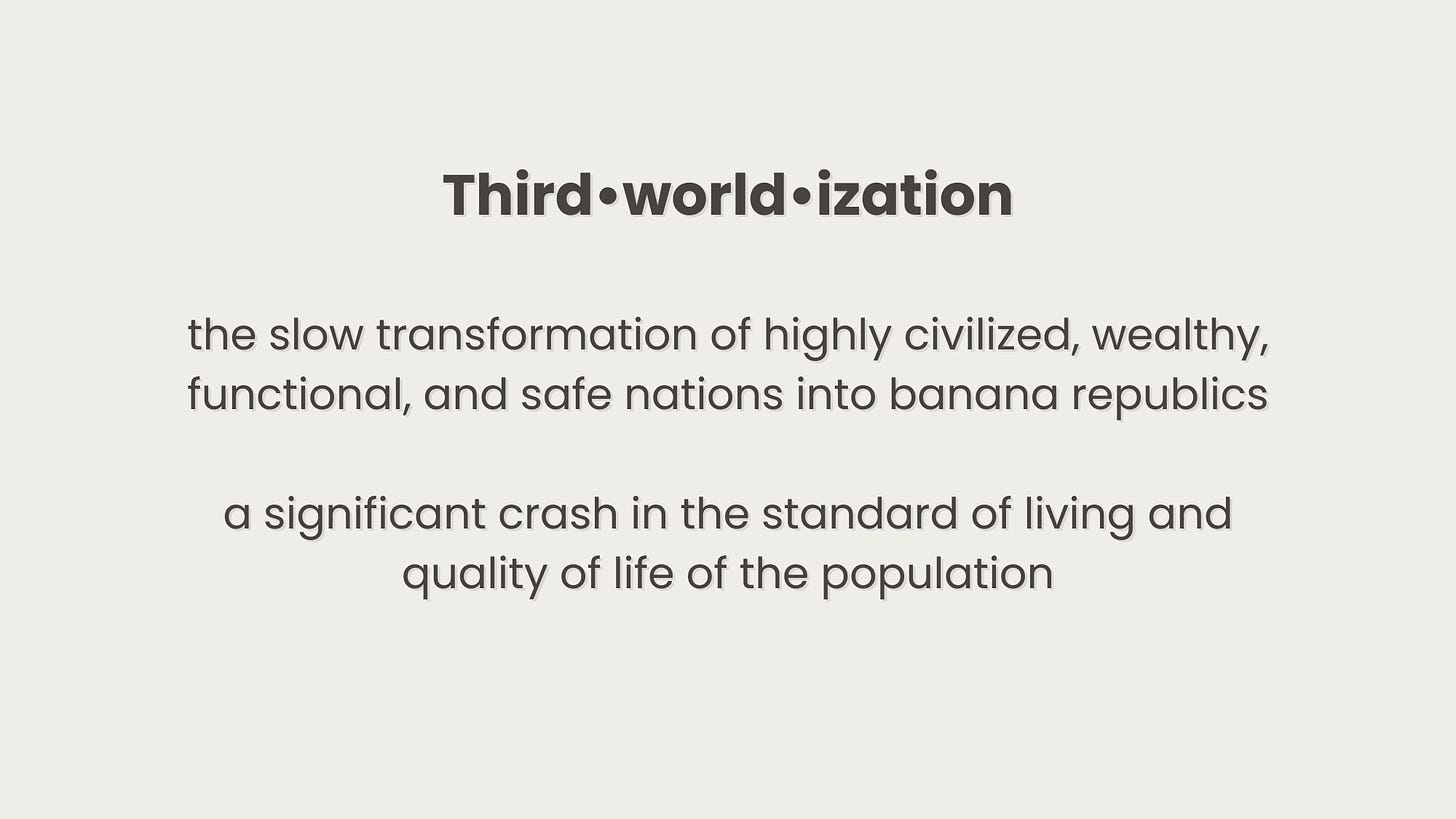Our insecure future may not be as bad as you think
An interview with Fabian Ommar, Stoic Survivor: "[T]hings never end up as good as we hope, but they never turn out as bad as we feared, either."
Today we’re sharing part one of an interview with someone who goes by the alias Stoic Survivor on the Internet. Fabian Ommar is the author of Street Survivalism : A Practical Training Guide To Life In The City and shares with Collapse Life readers his thoughts and insights on what’s coming and how to be ready.
Start by telling us a bit about yourself. You live in Brazil, which has been characterized by instability and precarity for decades — how did that give you a unique perspective on the transitions we're seeing as well as experiencing around the world right now?
My name is Fabian Ommar, I'm a 53-year-old engineer living in Brazil. It’s a big, beautiful country blessed with fair weather, diverse territory, abundant natural resources, and mostly devoid of significant natural and also geopolitical threats.
However, much of those favorable conditions and potential get squandered by a mix of backward mentality, corruption, bureaucracy, poor education, low productivity, and more. That keeps the wealth and privileges concentrated in the hands of too few, and too many trapped in poverty, ignorance, and a quotidian diet of instability, degradation and violence.
Admittedly, these deficiencies exist everywhere. But I'm talking really extreme concentration resulting in huge inequality. It’s not hyperbole, just damaging and hindering in ways hard to explain, and makes attaining sustainable progress or achieving a solid social contract next to impossible.
In practical terms, that disparity means a position between the First and the Third Worlds, the dubious distinction of being the 8th biggest economy on the planet while holding low humanitarian development indices.
At one point such perverse contrast can push a society into what I call "soft survival mode,” a rat race. While not an out-and-out fight, everybody ends up doing what it takes instead of what is right, moral, or contributes to the advancement and prosperity of the collective. And that which is bad for the hive is also bad for the bee.
I was born in the thick of a military regime that lasted between 1964 and 1985 and raised during the 70s and 80s, a period of profound global changes and instability. The first half of my life passed under stagflation, hyperinflation, monetary shocks, political turmoil, and social unrest. My father lost everything in the 1987 crash and had to start from scratch. We were never poor, but life was hard and my parents struggled to raise the family, as did everybody else.
I don't say that to mean I have either privilege or plight, much less to validate what I present — only to provide some context. That's just how it was. And being honest, life wasn't hell, far from it.
However, growing up like that, even if somewhat protected from the travails of adulthood, can provide some perspective and also some lessons on crises that indeed come in handy later in life or during hard times. So, in a way, it’s a form of preparation; if good conditions make people soft, the opposite must also be true.
Anyway, I see that process I just described taking place in much of the Western and also parts of the Eastern worlds. It’s been happening for some time now, actually, I call it Thirdworldization. In short, it’s the slow transformation of highly civilized, wealthy, functional and safe nations into banana republics, a significant crash in the standard of living and quality of life (two different things) of the population.
I must say that, objectively, I don't foresee the US, Canada, or Western Europe becoming as dysfunctional as a Third World country. I know both realities well enough to affirm that. It’s possible, though, and things will undoubtedly get much worse in these places, with the aggravation that a fall from grace is more painful when it happens from a high position.
I should also add that it sounds darker in prospect than it is in reality. In my opinion, citizens of the First World will feel the loss more than the actual consequences of it. We shall see. Sure, most will suffer and many will perish as it unravels, but the majority will adapt and march on; we're crafty and resilient creatures.
Life goes on, and it's perfectly possible to lead a normal life or be happy and move up during these events, or even wars, or other ‘shit hits the fan’ (SHTF) scenarios. It’s important to keep that in mind.
You wrote in your book Street Survivalism : A Practical Training Guide To Life In The City about some of the choices you made when the SHTF in Brazil during the Great Financial Crisis that helped you get through without the massive impact that others felt. How did that experience change you and your outlook?
I should preface this with some context.
Brazil — a commodities powerhouse — got out of the hole when Globalization emerged during the 90s and took off on the tailwinds of China's two-digit growth throughout the 2000s. In 2008, our country was flying high along the rest of the world, and we achieved some significant socioeconomic advancements that benefited larger parts of the population.
That crash sure caught everyone by surprise.
As it unfolded, I watched millions getting wiped out everywhere, people losing everything and going to the streets in droves, entire families. I got hit badly, and even though spared from the worst, I worried next time it could be me and my family living in a tent under some bridge. I sought to prepare, just in case that happened. After all, busts are cyclical and invariably worse than the last (and so are booms, by the way).
About that same time I discovered preparedness and survival as structured disciplines, and on top of all the crap hitting the fan and my delicate situation I got caught up in the typical beginner’s doomsday paranoia. Thankfully it didn’t last long, I took the lesson and moved on.
Today, I know it takes more than just financial ruin to turn someone homeless, but at the time I lacked that knowledge. Many are in the streets by choice. The reason I mention all that is because it’s important to be aware and avoid doom porn and overreacting, especially if you’re starting out.
Anyway, I figured experiencing the harsh and ruthless reality of the city streets with method, intent, and purpose would get me better prepared. I wanted to struggle, learn, find out how I'd fare in that world with few possessions and not a dime in the pocket. I was already using the urban space to test gear and skills, since I couldn’t go camping and backpacking as much in that period.
All that came together and merged into my street survivalism training, and the subject of my first book a few years later.
So despite having been raised "free-range" in the streets of a developing country during hard times, when I started staying and sleeping out, observing and interacting with the homeless and other street people, and doing the stuff I describe in the book, I experienced firsthand a distinct reality to the one I’d been living after growing up. Levels of discomfort, fear, and also accomplishment and joy I hadn't experienced in any of my previous activities.
If we do something like that voluntarily and for some time, it changes us. You gain awareness, toughness, confidence, and resilience, but also a deeper understanding of the frailty of the system that supports modern society and civilization, and the human condition in that context.
That knowledge and skills can be determinant to surviving a SHTF or even a crisis if you live in a city. You also learn that one's life in the streets depends less on something we can't control — the outside conditions — and more on one’s attitude, how capable one is to keep sanity and not lose it to crime, bad companies, drugs, alcohol, and other vices and temptations, the chaos and dirt of the streets.
Those practices and experiences also made me more grateful, even for my bad moments, losses, and setbacks, which are minor if I'm honest. It made me calmer, more tolerant, patient, confident, and disciplined. More aware, observant, compassionate, maybe tougher. I'm even more determined to work hard for my good and that of my family and community than before.
Like us, you believe "collapse" is not going to be a massive shock that brings everything crashing down overnight. Rather, as you’ve already explained, it's a slow process that chips away at our quality of life. How much dysfunction is in our future — are permanent favelas coming to cities in the West?
Excellent questions.
In practice, Thirdworldization means insecurity: suddenly, the future no longer seems as certain. Job, retirements, savings, freedom, and rights hang by a thread, or are just gone. Also energy, institutional, and political insecurity. Your government is turning against you and your neighbors, too. Everything becomes more volatile and fluid.
That’s a slow process, not easily recognizable, particularly by individuals and societies befuddled, gaslighted, and softened by bread-and-circus policies and manipulated by the elites in collusion with governments, corporations, and the legacy media. However, Thirdworldization can’t be contained and seeps through the cracks in the system.
It's just the times we live in; multiple factors converge now to create a polycrisis. That process includes some shocks here and there and happens in cycles, every few generations. Now, shocks are normal, even in a healthy system. The problems start to compound, or crises start to pile up, when an unhealthy and corrupt system becomes too unbalanced, weak, thus unable to absorb or deal with these attacks.
That doesn’t mean it will crumble, though. I don't believe, like you said, in a single, big shock or even multiple, simultaneous ones, taking civilization back to the stone age. This idea that the world will be like in a Mad Max movie is fantasy.
I’m not saying that only because something like that has never happened in modern history, it can’t happen now or one day. Of course it can, everything is possible. But not everything is probable. There’s some chance the sun will explode this year. Some chance doesn’t mean it’s going to happen.
The truth is that things never end up as good as we hope, but they never turn out as bad as we feared, either.
I'm aware that idea doesn’t get much love nor likes, especially in the ‘preppersphere.’ It doesn't sell stuff, thus many in the community get dismissive or contemptuous when SHTF is viewed in that perspective. The public also seems drawn to more apocalyptic themes and scenarios. That’s fine, but history is on my side. And that mindset comes from being born and living five decades in a developing country, I can’t help it.
As for favelas… Favelas are but one consequence and a stage of Thirdworldization. Homeless encampments are already multiplying across cities in the US and Europe. People forget they became widespread in US cities during the Great Depression, the shantytowns or Hoovervilles as they were called. Something similar can happen again. Probably not on the level seen in Caracas, Rio de Janeiro, or other cities in developing and Third World countries — that takes decades to happen. But they’ll be part of the landscape in the First World, too. No doubt.

A similar phenomenon driven by migration is areas, or even entire neighborhoods and districts, in which the presence of state institutions — law enforcement, utilities, services, maintenance — cease to act. Places ruled by a religious faction, drug cartel or other para-organization. France has more than 750 zones where Sharia is the law. Every favela in Rio or Caracas, or gang territory in Los Angeles, is a very different universe than the bigger context they’re inserted in.
Stay tuned for Part Two of this interview this Thursday, where Fabian shares his advice and strategies.
Please note that the link to Fabian Ommar’s book — Street Survivalism : A Practical Training Guide To Life In The City — is an Amazon affiliate link from the Collapse Life store.





Short of some huge disaster, natural or man made, there will be huge opportunities brought about by decline and instability. A lot of people became rich in the Great Depression.
As long as you are not overextended and know how to do stuff, you will be fine. The ones who will be wiped out are those who don't have any safety net. The ones saddled with rent, mortgages, car payments, credit card balances, and are living beyond their means. It will be the minor things that will wipe them out as one failure will cascade causing a chain reaction.
if we do away with the so called Elites that provide jobs, infrastucture, food, etc I wonder how it will go them?